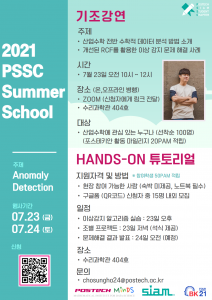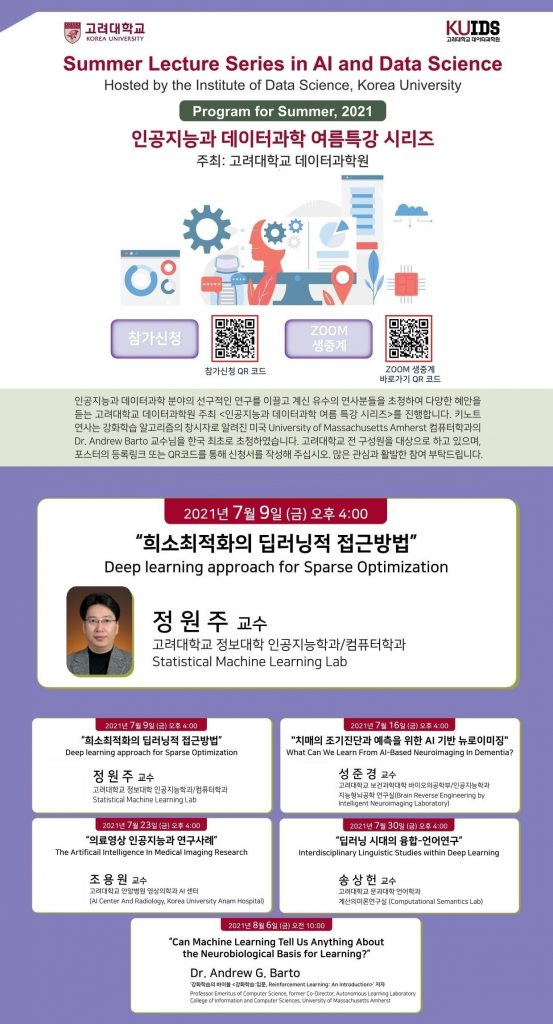2021년 7월 23일, 24일 실시하는 산업수학관련 여름학교입니다.
포스터링크:
https://www.notion.so/pssc2021/2021-PSSC-Summer-School-3fe07ecf12ec4ac3b8b0b9606b9c0720
신청링크:
http://m.site.naver.com/0OEqD

2021년 7월 23일, 24일 실시하는 산업수학관련 여름학교입니다.
포스터링크:
https://www.notion.so/pssc2021/2021-PSSC-Summer-School-3fe07ecf12ec4ac3b8b0b9606b9c0720
신청링크:
http://m.site.naver.com/0OEqD

고등과학원 특강입니다.
TIME: July 08 (Thu), 2021, 10:00-11:00/ 14:00-15:00
SPEAKER: 채동호 (중앙대)
TITLE: Mathematical Challenges in Fluid Mechanics I, II
Abstract : In this lecture we discuss some mathematical problems in the fluid mechanics. Many of the physical systems are described partial differential equations, and the mathematical study of these equations could have important and direct physical significances. In general, in the cases when the equations are nonlinear and nonlocal systems the study of solutions to the equations are much more difficult than the other cases. The fluid equations we are interested in corresponds to these cases. Among others we are particularly interested in the problem of singularities in the incompressible Navier-Stokes and the Euler equations. We emphasize that singularities in the solution of partial differential equations has direct physical importance in many cases. One fashionable example is the singularity of the Einstein field equation, which is nothing but the black hole. The other one is the singularities in the compressible Euler equations, which correspond to the shock waves. The singularities in the Navier-Stokes and the Euler equations are less understood than the two above cases. In the rest part of this lecture we introduce, in general terms, the problem of singularities in the fluids. In the second part we focus on some of the recent studies on the problem, related to the scenario of Type I singularities.
Zoom Link : https://us02web.zoom.us/j/89261183867
고려대학교 데이터과학원에서 주관하는
2021년 인공지능과 데이터과학 여름특강입니다.
7월 9일 희소최적화의 딥러닝적 접근방법, 정원주(인공지능학과/컴퓨터학과)
7월 16일 치매의 조기진단과 예측을 위한 AI기반 뉴로이미징, 성준경(바이오의공학부/인공지능학과)
7월 23일 의료영상 인공지능과 연구사례, 조용원(안암병원 영상의학과 AI센터)
7월 30일 딥러닝 시대의 융합-언어연구, 송상헌(언어학과)
8월 6일 Can Machine Learning Tell Us Anything About the Neurobiological Basis for Learning?, Andrew G. Barto (University of Massachusetts, Amherst)


데이터과학원 온라인(유투브) 강의 특강 링크입니다.
https://data.korea.ac.kr/?p=5000
심리학과 최준식 교수: 인공지능처럼 생각하기
언어학과 송상헌 교수: 파이썬 프로그래밍 기초다지기
전기전자공학부 김중헌 교수: 딥러닝 프로그래밍 기초다지기
컴퓨터학부 임희석 교수: 인공지능의 언어능력
인공지능학과 성준경 교수: 영상을 대상으로 하는 기계학습
컴퓨터학과 김현우 교수: 인공지능은 물체를 어떻게 이해할까?
인공지능학과 석흥일 교수: 의료인공지능
수학과 이동헌 교수: AI 밑에 감춰진 수학 들춰보기-목적함수
2021 q-day
고등과학원에서 열리는 q-series 관련 학회입니다.
일시: 2021년 6월 30일 수요일
장소: 온/오프라인
세부적인 프로그램 내용과 등록은 학회 홈페이지를 참고하세요.
https://sites.google.com/view/2021qday
2021년도 국가수리과학연구소NIMS 산업수학 학부연수생 모집 안내
이외 자세한 내용은 국가수리과학연구소(https://www.nims.re.kr/) 공지사항을 참고하기 바랍니다.
수학과 정기특강입니다
Operations preserving polynomially chi-boundedness
1. 일시 : 2021년 6월 4일 (금) 16:00-17:00
2. 장소 : 아산이학관 526호 및 Zoom을 이용한 실시간 온라인 강연 동시 진행
3. 연사 : 김린기 교수 (인하대 수학과)
4. 제목 : Operations preserving polynomially chi-boundedness
5. 초록 : A coloring of a graph G is a coloring of vertices of G so that no pair of adjacent vertices receive the same color, and the chromatic number of G is the minimum number of colors needed for a coloring of G. The main question regarding graph coloring in structural graph theory is the following: how can we control the chromatic number by controlling local structures of graphs? (…)
수학과 정기특강입니다
Data-driven modeling for stochastic systems with machine learning